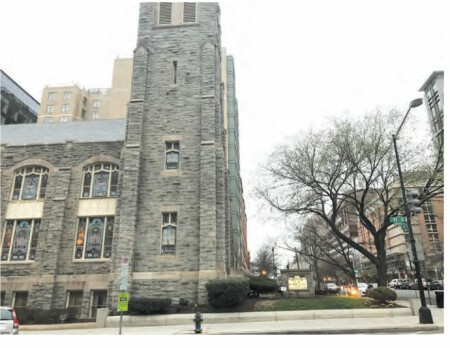Historic Black D.C. Church Becomes ‘Bridge’ for Racial Change
By Hamil R. Harris, Special to the AFRO
This article is reposted with permission. You can view the original article on AFRO.com.

Asbury United Methodist Church has been in D.C. for 181 years, and as part of its evolution in a changing landscape, the church has opened its doors to other worshippers despite race or religious preference. (Photo by Hamil Harris)
Hundreds of residents different in race, age, and religion gathered at a local Methodist Church to worship and find common ground on gentrification issues plaguing the city.
Masons, singing “Jesus the Light the of the world,” marched into the main sanctuary of the Asbury United Methodist Church for the 169th anniversary and Divine Service of the Most Worshipful Prince Hall Grand Lodge of the District of Columbia. While in the fellowship hall of the
“We see The Bridge as bridging the gap between people and God and people and people,” said the Rev.
While many Black churches have responded to gentrification issues, such as the inability to park, leaders of Asbury contract with an office building next to the church providing several floors of parking to their congregants, which they pay thousands of dollars a month for.
“Here in the downtown area certainly we have had many challenges but we have been here for 181 years and we plan to be here 181 more years by addressing the needs of people in this community,” Joseph N. Yearwood III, a member of the Board of Trustees at Asbury and a member of the Board of Trustees for the Masonic Grand Lodge of the District of Columbia, told the AFRO.
Meeting the needs of the community was on the mind of the Honorable Phillip David, grand master of the Most Worshipful Grand Lodge of the District of Columbia who during his inaugural address spoke about attending Advisory Neighborhood Commissions meetings and being more involved in the local community.
During her message, Mills went from pulling parts of David’s inaugural speech in January to quoting from Mathew 5:11 to make the point that the masons are needed in the community. Reading from New Testament, she talked about how John the Baptist sent disciples to Jesus with a simple question: “Are you the one who is to come, or should we expect someone else?”
“Are you the one!” Mills asked the Masons during a service where she challenged them to come from their temples and lodges to be more active in the community.”
Following the Divine
The Rev. Matthew Wilke, who like Mills, is a minister in the United Methodist Church, talked about the vision of Bridge and the reality of people worshiping together regardless of color. “Bridge is in the midst of
